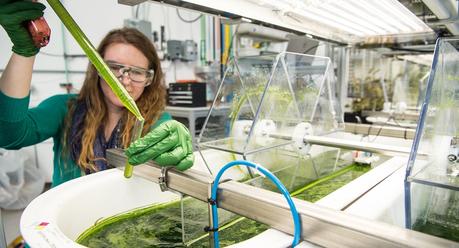
At this age, humanity is racing against the clock.
In a desperate attempt to reverse global warming, fight pollution, and find replacements for fossil fuels, we turn to new ideas. And while solar, wind, and geothermal energy all seem to be the right way forward, the search for other sustainable solutions is still ongoing.
According to many scientists, algae-based biofuel has the potential to be at least a stop-gap in the struggle for a better and cleaner world, as we most certainly will not be able to ditch combustion engines in many years to come. The unfortunate truth is that they power our cars, trains, and planes; allowing for a free flow of people and goods, thus making our world smaller and our lives better.
However, our engines don't necessarily have to run on petrol or diesel. With a little combined effort from the part of governments, investors, and environmental organizations, fossil fuels, commonly used across the globe, could be replaced with cleaner and more sustainable biofuels. Algae-based type is such a promising alternative.
Algae-based fuel as eco-friendlier alternative
The main advantage of biofuel is carbon-neutrality, the much-desired balance between carbon emissions and carbon removal.
In the case of algae, they absorb carbon dioxide as they grow, which makes up for emissions of an engine that runs on biofuel. And they can be used for much more than just cars, trains or planes. Scientists see them also replacing coal, diesel or LNG (Liquefied Natural Gas) at power plants around the world, and used to heat buildings.
The first algae-powered residential building, inaugurated in Hamburg, Germany, in 2013, is covered with algae which grows on the entire facade, and provides shade, for the comfort of its inhabitants.

Algae grow with the constant supply of nutrients, water, and CO 2 from the atmosphere. When they reach a bigger size, the excess is ready for harvesting, the pulp ferments in tanks, creating gas that then heats the building. Electricity is provided externally, from the grid, but when power plants in Germany transition to clean fuels, the carbon footprint of that building will be zero. It is not hard to see electricity produced there without the need for coal and using ecological replacements for fossil fuels soon.
The key advantages of algae-based biofuel
Algae-based biofuel has enormous potential when it comes to sustainable fuel sources. However, with the numerous advantages come also challenges that shouldn't be ignored. Let's have a more in-depth look at why this technology is very promising first.
Zero carbon footprint
Algal fuel is not only totally bio-based but also its combustion is 100% carbon neutral. Engines that run on it emit no additional carbon dioxide to the atmosphere, CO 2 absorbed from the air during the growth of algae equals total emission. Algae-based fuel is also superior to gas, coal, petrol and diesel because it is easy to cultivate.
Easily-adaptable technology
The shift from fossil to algae-based fuel could be rapid. A lot of vehicles already use biodiesel and biopetrol, and we could gradually increase the content of the renewable addition. That would give the industry the necessary time to produce a new generation of engines, able to take 100% algal fuel. In the same manner, we would engineer new bio-reactors, allowing for more efficient production of electricity and heat.
From lands to labs
Algae is a crop that we can cultivate with great ease and almost anywhere, outdoor and indoor. It doesn't have to interfere with other agricultural production as it can be grown even on barren lands with thin soil.

High efficiency
Unlike other biofuels, made of corn, sugarcane, liquid animal fats or vegetable oils, or animal manure, it is exceptionally efficient. In addition to being the most carbon-neutral of all bio-combustibles, algae offer higher energy capacity than any of the potential fuel ingredients above. It's the most efficient in terms of crop yield as one acre of an algal farm is able to produce approximately 80 times more oil than, for example, corn or sugarcane.
With the widespread introduction of this kind of crop, we could gradually withdraw from the production of other types of biofuel. Reclaimed land could be, in turn, used for food production, a subject becoming important with humanity said to reach 8 billion in just five years.
Sustainable production
Just as it is in the case of crude oil refining, production of algae-based fuel would allow for making numerous byproducts, for example, fertilizers, soap and other cleaning products, as well as for feeding animals.
Rapid growth
Algae grows fast. They can double their size within just one day, allowing us to meet even a rapidly developing demand.
The dubious side of algal biofuel
As with all new ideas and technologies, there are also certain limitations and concerns related to the production of green, algae-based fuel.
Complex processing
The energy balance is still not in algal fuel's favor, unfortunately. For the production of a combustible fuel we need dry powder, and with the current approach to powering the process, it takes more energy than the produced fuel would provide.
However, this technology is still in its infancy. Over time, scientists would most likely be able to overcome this problem with more efficient drying techniques as well as more effective algal lipid bio-reactors and engines. University of Utah engineers have already come up with a possible solution that could be a game-changer. However, it still has to be field-tested, so there is no definite verdict but certainly a lot of high hopes.
High demand for water
Algae cultivation requires large areas of water. Estimates claim that to meet just 10% of Europe's fuel demand, we would have to grow it on fields and in ponds the size of Belgium. It also requires the use of fertilizers - and these are not necessarily good for the environment as they produce large quantities of greenhouse gases and might lead to water poisoning.

Considerable initial expenses
The production of algal fuel would be expensive at first. Investments into the technology would have to be significant, with the returns being unknown. That could likely discourage many investors from putting their money into this new business. It would also take many years of technology development to reduce the price of harvesting and processing.
At the same time, we see plummeting crude oil costs, due to international conflicts, and OPEC countries increasing their production to make more money. Governments that would like to see the shift towards sustainability would have to introduce incentives in the form of grants, to make algae-based fuel prices competitive.
Biological risks
There is a danger of creating large-area monocultures, where algae would be the only crop for years. Monocultures often lead to over-cultivation of certain strains of plants which reduces their resistance to diseases.
However, this initial idea is now changing as a new research surfaced, including a study by scientists from the University of Michigan. They were able to determine that a diverse mix of various species would help to improve the stability and the yield of crops. Another advantage would be their resistance to pests and environmental changes.
Cheaper alternatives
Other biofuels are less expensive. Refining palm oil costs only $0,50 per kilo versus $1,80 for its algal counterpart. We must note though that palm oil plantations cause significant ecological damage as rainforests are burned down to make space for palm fields, resulting in the loss of animal life. With algae, there would be no such risks.
Problematic locations
Algae can grow in most parts of the world, however, to be profitable, only certain regions, with adequate weather conditions, can be considered. In some places, algae would have to be cultivated indoors, further increasing costs and the price of the product.
Conclusion
The production of algae-based fuel is still a relatively new technology. It definitely represents the radical change that we need in our approach to combustibles. If we want to see it put into practice, we must overcome some difficulties first.
As with all new ideas, fuel derived from algae comes with both pros and cons. It seems, however, that with enough research and development from scientists and engineers, the pros will outweigh the cons. As this type of fuel has everything that takes to be a breakthrough technology, all that we need at the moment is time to perfect the process and to make it much more cost-efficient.
Biofuels including algal types aren't perfect, but investing in them is important as they can help us decrease the amount of our carbon footprint while scientists develop new, better and more sustainable solutions. As it was observed many times before, with enough development as well as some goodwill and trust from the world's governments, it may become mainstream, making our lives much better and more sustainable.
Featured image by Geoffroy Hauwen on Unsplash
